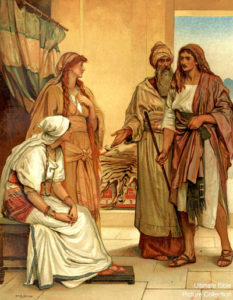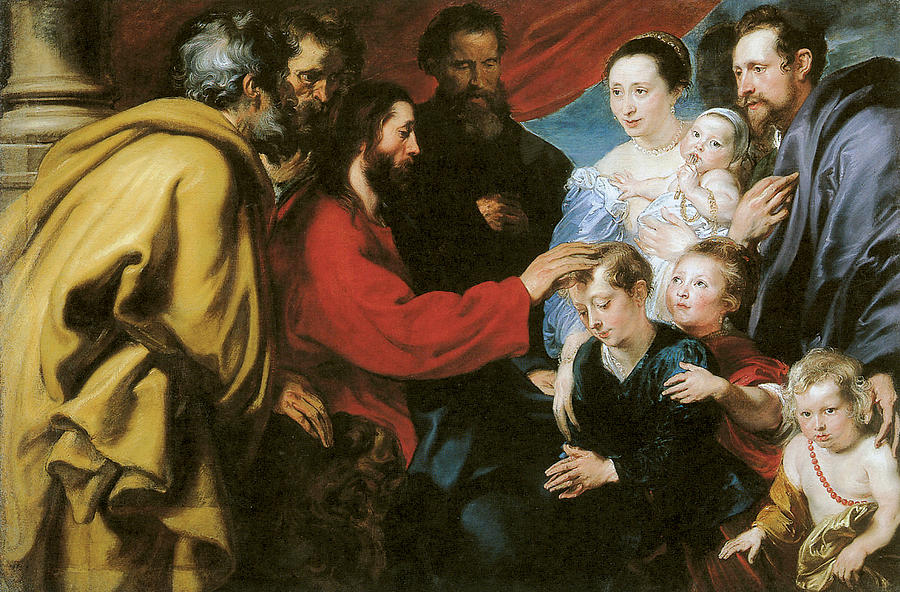Bible Study for Atheists is confusticated if not bebothered by a petty theft in Gen 31:
I’m confused by verse #31. Jacob seems to be confessing to taking Laban’s “gods” (idols). That’s before he says the thief must die (not knowing that the culprit was Rachel).
Odd that the punishment for stealing graven images should be so severe…
The background for the biblically-impaired is this: Jacob, after marrying two of Laban’s daughters and working for him over the course of two decades, decides to head back to Canaan one dark night with all his stuff, wives included. Upon discovering that Jacob has scarpered, his twice-over father-in-law catches up to him and accuses him of pilfering the household idols.

Now I take Jacob’s immediate answer, “Because I was afraid you might take your daughters by force,” to be answering Laban’s first question (“Why did you flee away secretly?”) and his second to be dealing with the issue of the idols. But why would Laban care about a couple pieces of badly-carved stone that could probably be replaced at a pagan temple for less than the cost of the animal upon which he rode?
One document recovered in the archaeological dig at Nuzi (beneath the modern Iraqi city of Kirkuk) might explain both Laban’s anxiety and Jacob’s agreement that whoever took them should die*:
“The tablet of adoption belonging to Nashwi, the son of Ar-shenni: He adopted Wullu, the son of Puhi-shenni. As long as Nashwi is alive, Wullu shall provide food and clothing; when Nashwi dies, Wullu shall become the heir.
If Nashwi has a son of his own, he shall divide (the estate) equally with Wullu, but the son of Nashwi shall take the gods of Nashwi. However, if Nashwi does not have a son of his own, then Wullu shall take the gods of Nashwi.
Furthermore, he gave his daughter Nuhuya in marriage to Wullu, and if Wullu takes another wife he shall forfeit the lands and buildings of Nashwi.
Whoever defaults shall make compensation with one mina of silver and one mina of gold.”
— ANET pp. 219-220, Document published and translated by C.J. Gadd, RA, XXIII (1926),49-161, No. 51.
The Nuzi documents are generally 16th-14th Century BC and cast no little illumination on the times in which Jacob lived. For example, in this document a man named Nashwhi adopts one named Wullu to be his heir, and it’s quite possible that Laban’s exhortation to Jacob to “abide with me” (Gen 29:19) is the same sort of agreement.
Note the parallels:
Nashwi provides a wife for Wullu / Laban provides a wife for Jacob (29:19)
Wullu cannot take another wife / Laban charges Joseph to take no other wives than his daughters (31:50)
Wullu shall divide the estate with the natural sons only after the death of the Nashwi / Laban claims all that Jacob left with is still his (31:43)
But the most interesting one is this:
If Nashwi has a male heir, he inherits the ‘gods’ and Wullu cannot take them, but if he does not have an heir, then Wullu gets them.
It seems the gods are not simply carved stone idols that could be replaced at the corner idol shop, but are tied up somehow in the familial rights of inheritance.
Before Jacob left, Laban’s natural sons were concerned (31:1) that Jacob was horning in on their inheritance, but his daughters were afraid (31:14) that they were being cut out. So when they leave, Rachel steals the idols, by which she may have some legal claim over her father’s property. Her father Laban for obvious reasons freaks out. As inheritance rights were among the most important of all rights during the period**, it is unsurprising that Jacob defends his own honor by agreeing to support the ultimate penalty against the guilty.
The Israelite people would obviously have no knowledge of the legal significance of idols – items banned in their own culture*** – in pagan Mesopotamia 500 years before Genesis is alleged to have been written. And the fact that this strange episode is not explained in Genesis is best explained by the fact that this portion of Genesis dates to a period in which the significance was widely understood, i.e. in Mesopotamia long before Moses. The discovery of the Nuzi tablets in 1925 is just one more stake in the heart of JEDP and the idea that Genesis was written hundreds of years after Moses.
* As Genesis notes, Jacob did not know his wife had stolen them, so this may just be a bit of bravado on Jacob’s part as well.
** Unlike today of course, where inheritance never sets family members against one another. Except one guy with whom I worked back in the 80s. He had three jobs: cooking in the morning, cutting lawns all day, and passing the wee hours in a donut shop. I asked John one day why he worked so hard. His answer was that his brother had stolen all his money when their mother died, so he was saving up enough to retire. That way he would have time to hunt down his brother and kill him. I don’t know if he ever did.
*** That doesn’t mean that they didn’t have them – they did, a fact that Moses indicts them for any number of times. But with inheritance rules in Israel set by law, idols did not serve the same purpose.










Hunh. Never heard that bit about inheritance rights before, and is an interesting historical point.
But does it need to be so vague? We moderns have pretty much completely gotten away from viewing objects as having any true significance. The household gods that were pilfered from Laban, in his mind, was god itself. That would piss the man off and infuriate him that someone literally took god from him. Time to go get god back.
The parallel could be when the Philistines took the Ark. Eli fell over dead when he heard the news. Someone had stolen God. It’s just something those of us with Protestant roots don’t understand about the significance of objects.
Maybe that is why Rachel was so keen to keep them? She possibly viewed the household gods as god too. In verse 5, when Jacob was talking to them, he speaks of “the God of my father”. Rachel was still rolling around as a pagan, and had a natural affinity for her old god.
I suspect it’s one and the same. This idol was ‘god’ and was the inheritance. From what I understand about how some treated their idols, the family fortunes were tied up in keeping idols happy.
4.5